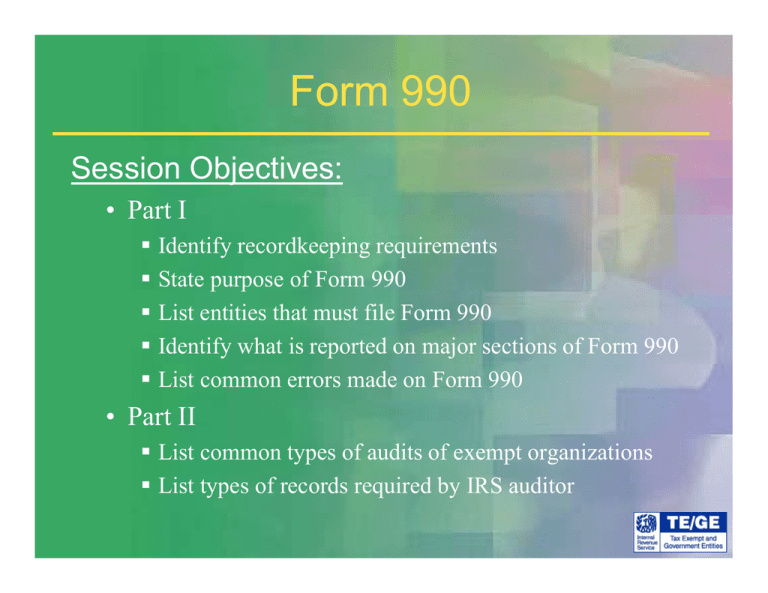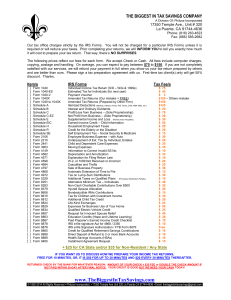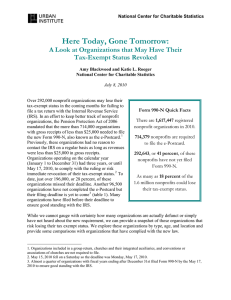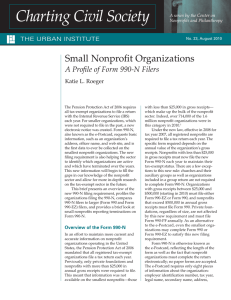Form 990 Session Objectives: j • Part I
advertisement

Form 990 Session Objectives: j • Part I Identify recordkeeping requirements State purpose of Form 990 List entities that must file Form 990 Identify what is reported on major sections of Form 990 List common errors made on Form 990 • Part P II List common types of audits of exempt organizations List types of records required by IRS auditor Purpose p of Form 990 • To provide information on your organization’s programs and activities • Almost all of the information reported on the form is open to public inspection • Most state agencies that regulate exempt organizations use the Form 990 to satisfy their filing requirements rather than create their own form What to File Form 990-EZ • gross receipts ≥ $25,000 and < $100,000 and • total assets ≤ $250,000 Form 990 • gross receipts > $100,000 or • total assets > $250,000 Form 990-PF • private foundation What to File Form 990-N • For tax years beginning after December 31, 2006 (Filing begins in 2008) • Gross Receipts <= $25,000 ( ) • Filed Electronicallyy (E-Postcard) www.irs.gov/eo or http://epostcard.form990.org/ • Failure to file Form 990-N (E-Postcard) for three consecutive years will result in revocation of exempt status. What to File Form 990-N Filing g Exceptions p • Organizations included in a group return q to file Form 990-PF • Private Foundations required • Section 509(a)(3) supporting organizations required q to file Form 990 or 990-EZ and • Churches, their integrated auxiliaries, and conventions or associations of churches When to File Due date: • 15th day of the 5th month after the organization’s accounting period ends. Example: • May 15 for an organization with a December 31st year-end. Extension: • File Form 8868 on or before the due date E-File E-File • Electronically (E-File) For tax years beginning after December 31, 2006, e-filing is mandatory for certain large tax-exempt organizations: • $10,000,000 or more in assets and files 250 or more returns per year • For a private foundation or non-exempt charitable trust, must efil if they file, th file fil more then th 250 returns t annually. ll • E-file is optional for smaller organizations E-File is distinct from the 990-N (E-Postcard). EFiling applies to all other exempt organization returns t such h as the th 990, 990 1120 1120-POL, POL etc… t Other Forms Other Filing g Requirements q • 1099-Miscellaneous w/ Cover Form 1096 for payments to independent contractors over $600 • 941/944, W-2s and W-3s for payments to employees • 990-T for unrelated business income • W-2Gs for reportable winnings from raffles, bingo, and other gaming activities • 730 or 11-Cs for wagering and occupational taxes Other Forms Raffles, Bingo, g etc… • It’s common for charitable organizations to conduct raffles and other gaming activities. • Publication 3079 is available on the IRS Website Not all gaming activities or gambling winnings require reporting, but some do. Publication 3079 goes through various rules that will help organizations determine whether they are required to file the different gaming forms (W2-G, 730, 11-C), when withholding is required, etc... W-2G Chart ((From Pub. 3079)) Recordkeeping p g • No required system • Clearly show income and expenses from your activities ti iti • Records that support particular items should be kept until the period of limitations for that return runs out, commonlyy 3 years y after the return is filed or due, whichever is later Remember to keep copies of the filed returns Recordkeeping p g Permanent records to be kept p throughout g the organizations’ existence: Application for exemption Determination letter granting tax-exempt status Articles of incorporation, bylaws, or other organizing documents Audit Process Records requested during an audit include: • • • • Governing documents Financial records An audit report, if you have one Minutes of meeting of the Board of Directors and principal committees • Copies of any other federal tax returns your organization has filed and any related work papers • Pamphlets, brochures, and other printed literature describing your organization’s activities • Correspondence C d files fil Other Topics p www.irs.gov/eo g • IRS website has various information detailed including: More information on the 990-N (E-Postcard) filing requirements Pension P i Protection P t ti Act A t Applying For Exemption E-Filing Redesigned Form 990 For More Information Specialized Assistance on Tax-Exempt Organizations through the Exempt Organizations (EO) division of the IRS: (877) 829-5500 (toll-free) Customer Account Services Internal Revenue Service TE/GE Customer Account Services P.O. Box 2508 Cincinnati, OH 45201 IRS tax forms and publications specific to charities are available on the EO website




